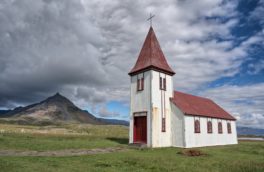This conversation happens on the regular for me:
“Pastor, I just can’t do it anymore,” the frustrated congregant will say.
“What can’t you do anymore?” I’ll reply, though I suspect I know the answer.
“This. The whole thing. Church. There’s just so much hypocrisy. So much scandal. Leaders are falling left and right. Ministries are being discredited. Entire denominations are failing. And rather than being places where the way of Jesus is deeply cultivated, the church just seems, I don’t know, shallow and superficial at best, consumeristic and dominated by partisan politics at worst. I love Jesus. And I want to follow Jesus. But I can’t do this anymore. I’m out.”
I’m guessing if you’re a pastor or church leader, you’ve had that conversation too—probably many times over. If you’re like me, you love them. The Spirit speaks prophetically to the church in many ways, not least through the voices of those who are ready to throw in the towel because of how spiritually bankrupt the church often proves to be. The Spirit speaks prophetically to the church in many ways, not least through the voices of those who are ready to throw in the towel because of how spiritually bankrupt the church often proves to be. Click To Tweet
Indeed, many of us in church leadership are doing the very work we are doing precisely because we also have felt the burning heat of prophetic indignation—and yet believe that God has not and will never abandon his people. And so, when I have those conversations with frustrated and ready-to-throw-in-the-towel congregants, I lean in—both for the church’s sake and for theirs. The Spirit is speaking.
Yet the questions remain: just what is the Spirit speaking in our frustrations, and how do we creatively engage the Spirit in a way that builds up rather than tears down, that edifies rather than destroys—not only our own lives but the greater life of the church?
What is the Spirit speaking in our frustrations, and how do we creatively engage the Spirit in a way that builds up rather than tears down, that edifies rather than destroys—not only our own lives but the greater life of the church? Click To Tweet
Lessons from the Desert
We can learn something from what may strike some as an unlikely place—the desert. During the third, fourth, and fifth centuries after Christ, when Christianity was finally beginning to “arrive”—clothed suddenly with political power and cultural legitimacy through the Constantinian revolution—a group of folks within the church began to worry that the mainstreaming of Christianity meant the death of its soul. As a result, they retreated into the deserts of Egypt, Syria, Palestine, and Arabia to seek God and recapture the radical way of Jesus.
We know them as the Desert Fathers and Mothers, and the importance of their witness cannot be overstated. As David Bentley Hart writes:
It was from them that another current opened up within Christian culture: a renunciation of power even as power was at last granted to the church, an embrace of poverty as rebellion against plenty, a defiant refusal to forget that the Kingdom of God is not of this world. The sayings of the desert fathers have been copiously preserved, and they are fascinating testaments to the birth of a new spiritual polity in the very midst of the Christianized empire, a community whose sole concern was to discover what it really meant to live for the love for God and one’s neighbor, to banish envy, hate, and resentment from the soul, and to seek the beauty of Christ in others.[1]
Hart goes on to explain that the desert movement represented Christianity’s “rebellion against its own success,”[2] a rebellion that wound up re-revolutionizing the very Christian movement out of which it was birthed. Men and women from across the Roman Empire journeyed into the desert to seek out the wisdom of these Abbas and Ammas—men and women garmented in the kind of authentic, spiritual authority that comes from knowing the face of God.
The desert movement represented Christianity’s “rebellion against its own success,” a rebellion that wound up re-revolutionizing the very Christian movement out of which it was birthed. Click To Tweet
Before long, men like John Cassian and Benedict of Nursia were founding monasteries based on the teachings of the desert fathers and mothers. (In fact, much of the Christian monastic movement is a direct outgrowth of the desert movement that preceded it.) Church leaders like Gregory the Great were making the precepts of the desert foundational for the life of the clergy. Indeed, much of what we take for granted as “normal” for the life and conduct of pastors and leaders even in our modern era can be traced directly back to the witness of the desert fathers and mothers.
Now, so you don’t lose the plot here in my little excursus, here’s the point: the frustration of believers in the third, fourth, and fifth centuries bore fruit for the kingdom and is bearing it still in our time.
And that is a word for us. There is a way to engage our frustrations with the church that is Spirit-led and Spirit-inspired and leads to life and not to death. The desert fathers and mothers have left a pattern for us to follow. What can we learn from them?
Let me suggest three things:
First, they teach us the value of creative distance. A common misconception of the desert fathers and mothers is that they severed themselves absolutely from the church. While some did (often to their own spiritual detriment), the vast majority stayed connected to the worshiping community. Historian Owen Chadwick explains that “withdrawal into total solitude was found to lead to moral collapse, mental eccentricity, even to madness. The hermit was one of a company of hermits, who lived under a common discipline with a superior; who said their allotted psalms, each in his cell, at common times each day; who met on Sundays at least, sometimes on Saturdays as well, for common worship and a common meal and a discussion of the spiritual life.”[3]
A common misconception of the desert fathers and mothers is that they severed themselves absolutely from the church. While some did (often to their detriment), the vast majority stayed connected to the worshiping community. Click To Tweet
The men and women of the desert were Christians before they were anything else, which meant that they understood that an accountable, worshipping community is a nonnegotiable element of the spiritual life. So they cultivated it, even as they reshaped their relationship with the wider church, standing somewhat aloof from it while maintaining a solidarity of identity with it. And in so doing, they discovered forms of being the church that were more faithful to the way of Jesus and subsequently re-evangelized the church.
I think that there is much wisdom here. Often when I talk to folks who are on the verge of throwing in the towel, what is needed is the permission to similarly cultivate a bit of “creative distance” from the chaos that has them so frustrated. “Find some friends,” I’ll tell them, “and begin practicing some spiritual disciplines together. Find a good spiritual director who can help you stay in touch with the movement of the Spirit in your own soul. And if you need to dial back your involvement with your church for a bit just to give yourself some breathing space—or if for whatever reason it is no longer tenable to be at the church you are at and you feel you need to find a new one—then do it. Just keep worshiping somewhere. You need it. And so do they.”
The men and women of the desert understood that an accountable, worshipping community is a nonnegotiable element of the spiritual life. So they cultivated it, even as they reshaped their relationship with the wider church. Click To Tweet
Helping people discover a middle way between doing nothing and severing their relationship with the church altogether can do a world of good.
Second, they teach us the value of removing the plank from our own eye. Let’s be honest here. One of the things that quickly spoils the Spirit’s work in our frustrations is the introduction of self-righteousness. Our perception of what’s wrong can quickly turn to pride—we’re not like “those people” who are doing all those terrible things. And right there, the trap is sprung—we have become Pharisees. This is why even while the desert fathers and mothers would have affirmed the churchly frustrations of the pilgrim seeking wisdom, they also would have been quick to counsel them to a spirit of nonjudgmental humility, recalling the words of Jesus:
Do not judge, or you too will be judged. For in the same way you judge others, you will be judged, and with the measure you use, it will be measured to you. Why do you look at the speck of sawdust in your brother’s eye and pay no attention to the plank in your own eye? How can you say to your brother, “Let me take the speck out of your eye,” when all the time there is a plank in your own eye? You hypocrite, first take the plank out of your own eye, and then you will see clearly to remove the speck from your brother’s eye. (Matthew 7:1-5, NIV)
The theme of nonjudgmental humility is everywhere in the desert tradition. Abba Euprepius said, “If a man is possessed of humility and poverty, and if he does not judge others, the fear of God will come to him.”[4] Abba Joseph said, “If you want to find rest here below, and hereafter, in all circumstances say, ‘Who am I?’ and do not judge anyone.”[5] Abba Moses said, “The monk must die to his neighbor and never judge him at all, in any way whatever.”[6] Indeed, for the desert fathers and mothers, the point of the retreat into the wilderness was not principally frustration but purification, which would naturally lead one to a place of nonjudgment, as Abba Moses himself said so brilliantly: “When someone is occupied with his own faults, he does not see those of his neighbor.”[7]
For the desert fathers and mothers, the point of the retreat into the wilderness was not principally frustration but purification, which would naturally lead one to a place of nonjudgment. Click To Tweet
It is not that the speck in the church’s eye does not matter. It surely does. However, the desert fathers and mothers remind us that we cannot be genuinely helpful to others until we have walked the long road of personal transformation, which includes letting go of our (often prideful, angry, and self-oriented) judgments of others. As Dallas Willard explains, “Condemnation is the board in our eye.”[8] Only a people purified of the need to judge others can really help others.
Only a people purified of the need to judge others can really help others. Click To Tweet
Third, they teach us the value of doing all things for the love of God. Frustration may have instigated the desert movement, but it did not fuel it. Anthony of Sorouzh explains:
We have a great deal to learn from their integrity and their unrelenting courage, from their vision of God—so Holy, so great, possessed of such love, that nothing less than one’s whole being could respond to it. These were men and women who had reached a humility of which we have no idea, because it is not rooted in a hypocritical or contrived depreciation of the self, but in the vision of God, and a humbling experience of being so loved.”[9]
Or as the aforementioned Abba Moses said to John Cassian, “Everything we do” is done “in order to rise step by step to the high point of love.”[10]
Everything we do is done for love. The point is crucial. What, after all, are the manifold failures of the church but failures of love? We are called to love and worship the Lord our God with all of our heart, soul, mind, and strength and love our neighbors with the kind of self-sacrificing, others-preferring love that Jesus showed us. Instead we worship money, sex, and power and thereby make a mockery of ourselves, abusing one another and the world around us.
The church is a mess, friends, but it is a mess principally because it is bankrupt of love. And if there is any hope for it, if there is any chance that it can be made right, it will be precisely because the Spirit has reawakened divine love in its members.
The church is a mess, friends, but it is a mess principally because it is bankrupt of love. And if there is any hope for it, it will be precisely because the Spirit has reawakened divine love in its members. Click To Tweet
Leaders, let’s validate the frustrations we see in others and feel in ourselves. They’re real. And the Spirit is speaking in them, calling us again to the love of God and neighbor that is quite simply the essence of being human.
So let us heed the Spirit’s call and the witness of the desert to become once more a people marked by love.
[1] David Bentley Hart, Atheist Delusions, Yale University Press, p. 240
[2] Hart, p. 241
[3] Owen Chadwick in introduction to John Cassian: Conferences, Paulist Press, p. 5
[4] Benedicta Ward, The Sayings of the Desert Fathers, Liturgical Press, p. 62
[5] Ward, p. 102
[6] Ward, p. 141
[7] Ward, p. 141
[8] Dallas Willard, The Divine Conspiracy, Harper Collins, p. 224)
[9] Ward, p. xvi
[10] Cassain, John Cassian: Conferences, Paulist Press, p. 41
















Missio Alliance Comment Policy
The Missio Alliance Writing Collectives exist as a ministry of writing to resource theological practitioners for mission. From our Leading Voices to our regular Writing Team and those invited to publish with us as Community Voices, we are creating a space for thoughtful engagement of critical issues and questions facing the North American Church in God’s mission. This sort of thoughtful engagement is something that we seek to engender not only in our publishing, but in conversations that unfold as a result in the comment section of our articles.
Unfortunately, because of the relational distance introduced by online communication, “thoughtful engagement” and “comment sections” seldom go hand in hand. At the same time, censorship of comments by those who disagree with points made by authors, whose anger or limited perspective taints their words, or who simply feel the need to express their own opinion on a topic without any meaningful engagement with the article or comment in question can mask an important window into the true state of Christian discourse. As such, Missio Alliance sets forth the following suggestions for those who wish to engage in conversation around our writing:
1. Seek to understand the author’s intent.
If you disagree with something the an author said, consider framing your response as, “I hear you as saying _________. Am I understanding you correctly? If so, here’s why I disagree. _____________.
2. Seek to make your own voice heard.
We deeply desire and value the voice and perspective of our readers. However you may react to an article we publish or a fellow commenter, we encourage you to set forth that reaction is the most constructive way possible. Use your voice and perspective to move conversation forward rather than shut it down.
3. Share your story.
One of our favorite tenants is that “an enemy is someone whose story we haven’t heard.” Very often disagreements and rants are the result of people talking past rather than to one another. Everyone’s perspective is intimately bound up with their own stories – their contexts and experiences. We encourage you to couch your comments in whatever aspect of your own story might help others understand where you are coming from.
In view of those suggestions for shaping conversation on our site and in an effort to curate a hospitable space of open conversation, Missio Alliance may delete comments and/or ban users who show no regard for constructive engagement, especially those whose comments are easily construed as trolling, threatening, or abusive.